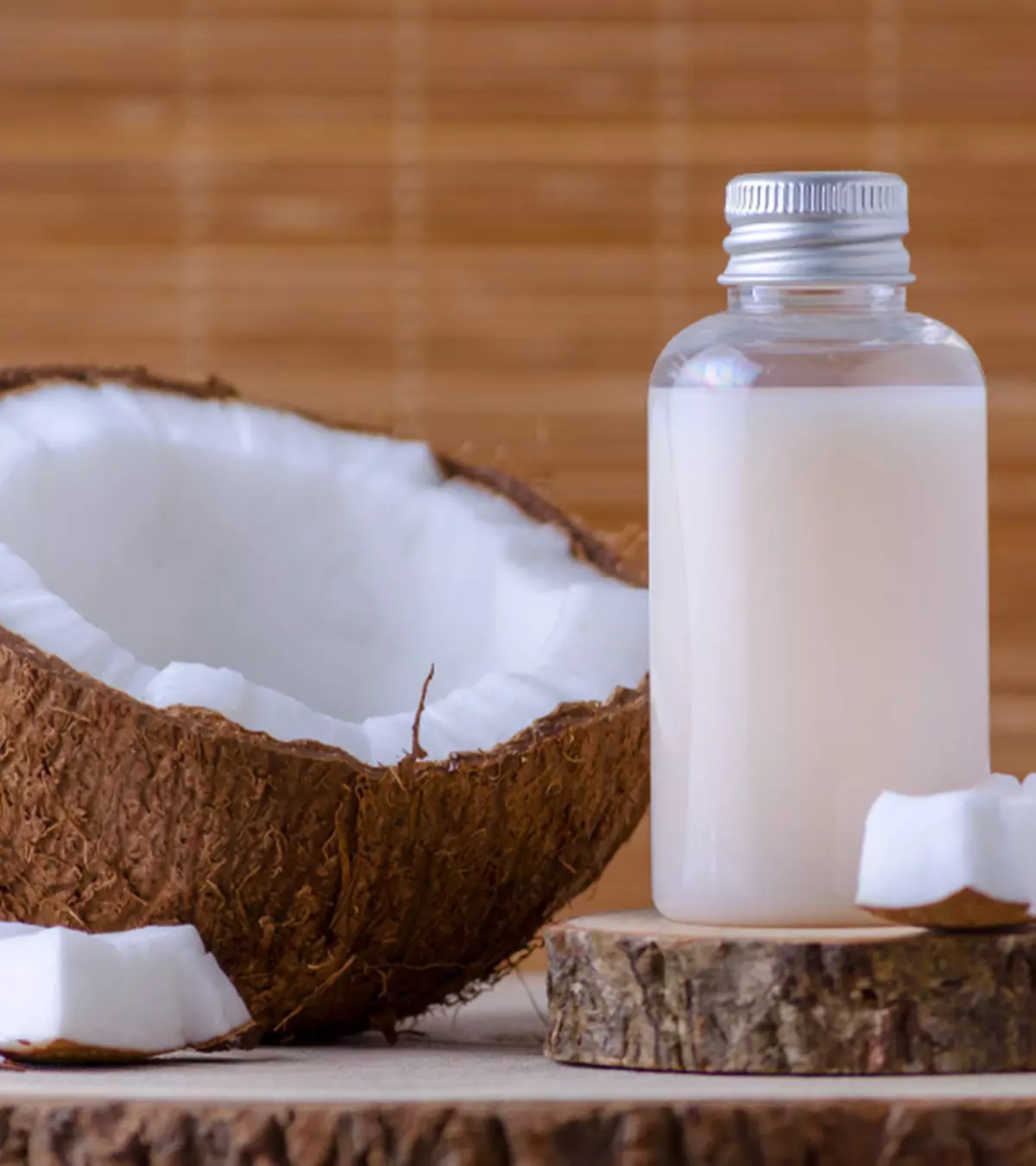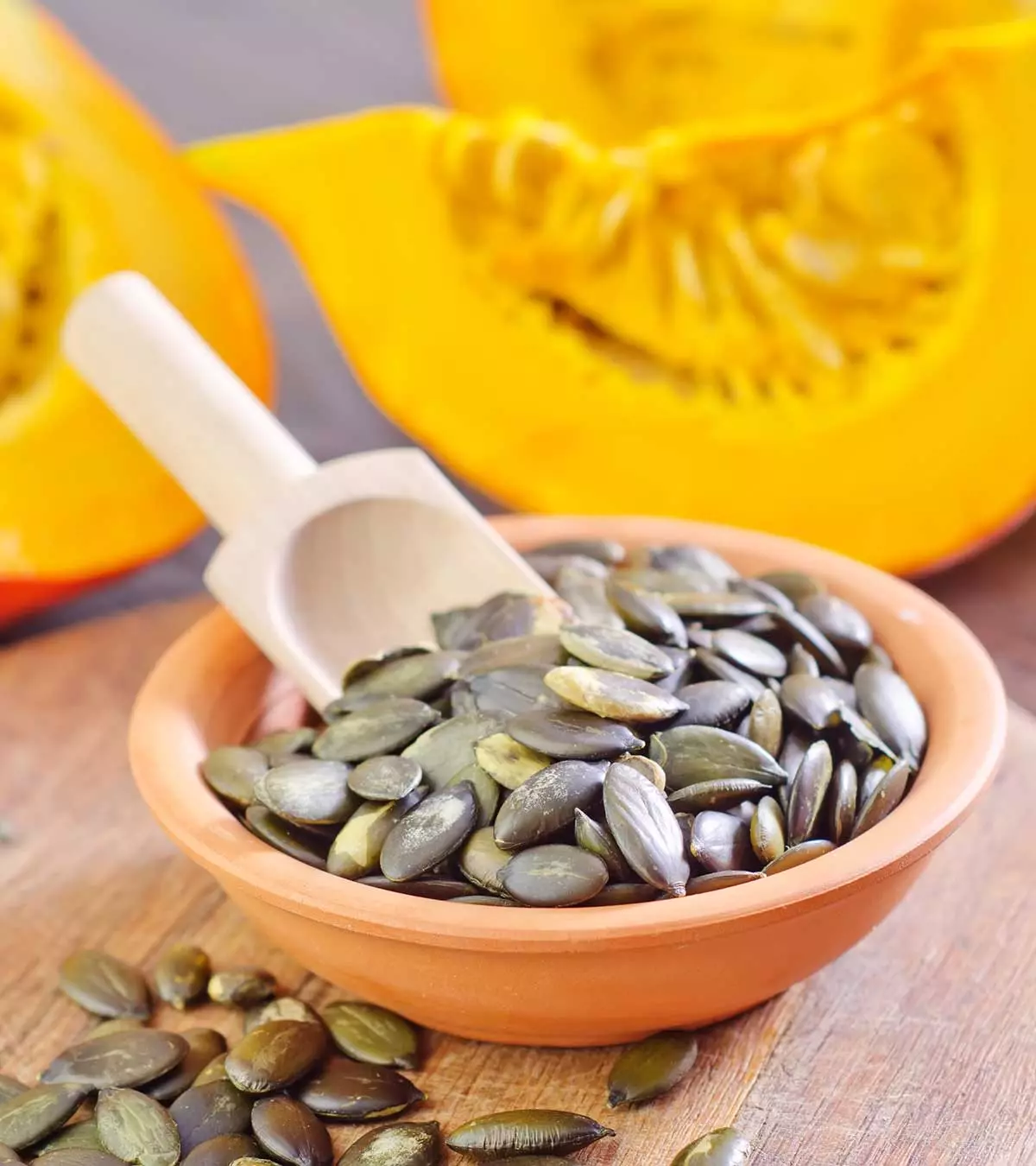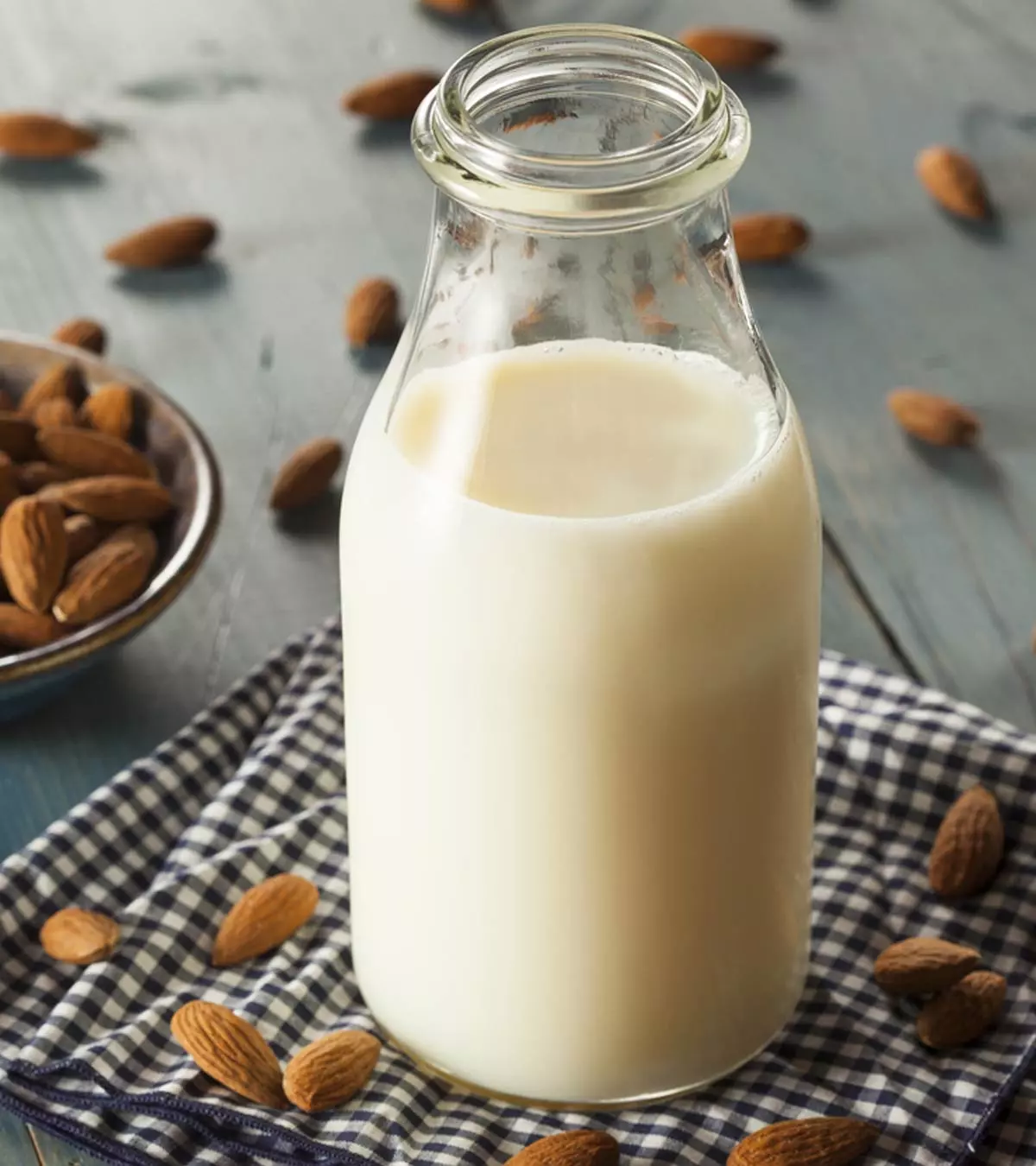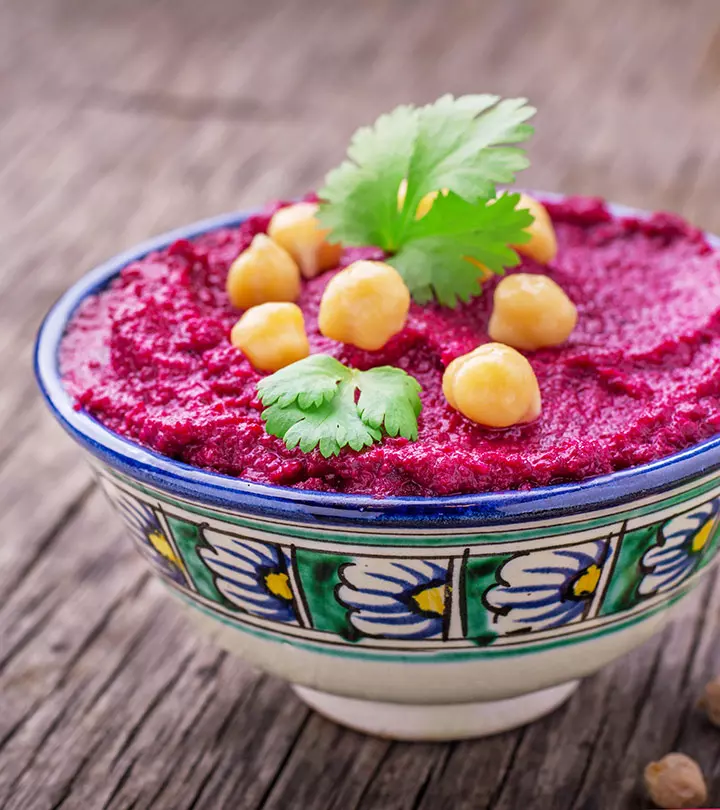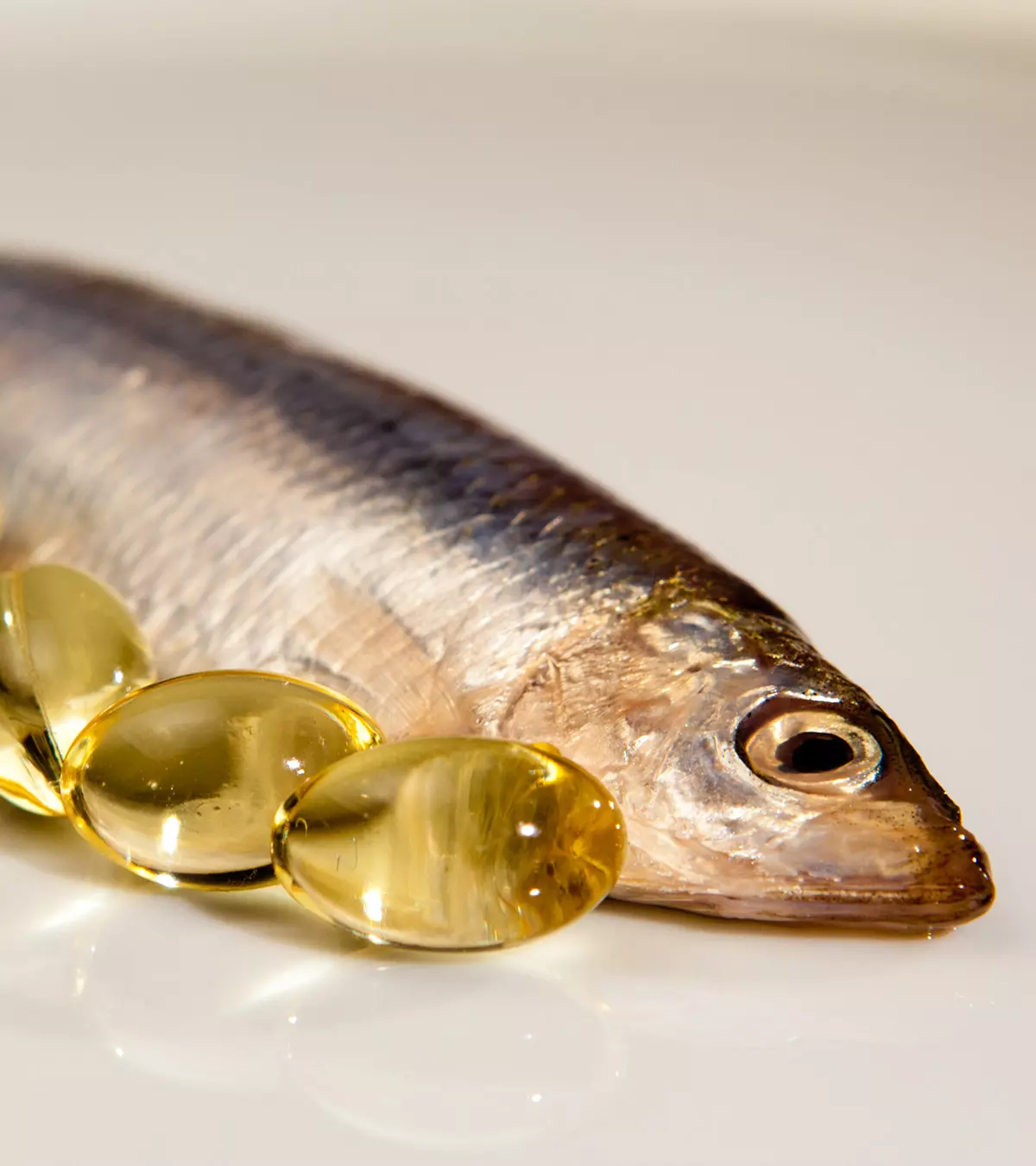
Image: Shutterstock
Omega-3 fatty acids are healthy fats that are required in increased amounts during pregnancy for the proper development of the retina and fetal brain (1). Therefore, you may consider consuming fish oil during pregnancy to help you get these essential fatty acids. There are other sources of omega-3s, but fish oil has the highest concentration of these essential fats. Keep reading this post about the safety of consuming fish oil during pregnancy, its benefits, recommended dose, risks, and methods to include it in your pregnancy diet.
Key Pointers
- Fish flesh oil is healthy, while fish liver oil is unhealthy during pregnancy.
- Fish oils can manage prostaglandin production, prevent mood disorders, and aid in fetal development.
- Overconsumption of fish oils can hinder blood clotting and harm the fetus.
- When purchasing fish oil, check for the Natural Product Number (NPN) and ensure its quality.
Is It Safe To Take Fish Oil During Pregnancy?
Yes and no, since it depends on the type of fish oil you consume. There are two types of fish oil.
- Fish oil taken from the body (i.e., flesh) of the fish is safe.
- Oil taken from the liver of fish, i.e., cod liver oil, is not safe during pregnancy as it contains high levels of retinol (vitamin A), which puts your baby at risk of congenital disabilitiesiStructural or functional abnormalities occurring during pregnancy and present since birth in an individual .
When used the right way, fish oil can be beneficial during your pregnancy.
What Are The Benefits Of Fish Oil During Pregnancy?
Fish oil offers benefits derived from two types of omega-3 fatty acids: EPA (eicosapentaenoic acid) and DHA (docosahexaenoic acid).
- Balanced production of prostaglandins: Omega-3s found in fish oil manage the production of prostaglandins that regulate blood pressure, blood clotting, inflammation, and allergic responses, gastrointestinal and kidney functioning, hormone production, and nerve transmission (2).
- Support with positive mood: EPA and DHA are known to support positive mood and overall maternal health during the pregnancy and postpartum period. Thus, consuming fish oil may help reduce the risk of pregnancy-related anxiety and postpartum depression (3).

Image: Shutterstock
- Fetal development: Studies show that mothers who had fish oil supplements had babies with optimal fetal growth and neurological development such as improved hand-eye coordination and brain development (4).
According to a study by researchers from Copenhagen Prospective Studies on Asthma in Childhood (COPSAC), the supplementation of fish oil during pregnancy can help a healthy increase in the child’s weight in the first six years of life but does not cause obesity or excessive weight gain. The study indicates that fish oil supplementation increases lean mass, bone mineral content, and fat mass by 280.7g, 10.3g, and 116.3g, respectively.
- Safe pregnancy and labor: Omega-3s in fish oil are also known to lower the risk of preterm labor and preeclampsia in pregnancy and can help manage your weight (5).
- Improved immunity in infants: Omega-3s have powerful anti-inflammatory properties that can strengthen your newborn’s immunity against allergies, common cold, flu and other immune-mediated diseases (6).

Image: Shutterstock
That said, fish oil consumption might also have adverse effects in some.
 Did You Know?
Did You Know?What Are The Side Effects Of Consuming Fish Oil In Pregnancy?

Image: Shutterstock
Here are the possible risks of consuming fish oil.
- Overconsumption of fish oil will affect your blood’s ability to form clots, as omega-3s reduce the stickiness of platelets (7).
- Fish oil sourced from fishes, which have higher mercury levels, can harm the unborn baby. It, therefore, affects the development of the baby’s brain and nervous system. So avoid oils of shark, tilefish, swordfish and king mackerel (8).
- Fish oil supplements extracted from the liver contain high levels of Vitamin A, which can be harmful to the baby.
Consuming no more than the recommended daily intake of fish oil will minimize the risks.
What Is The Recommended Dosage Of Fish Oils During Pregnancy?
The daily recommended dosage of omega-3 fatty acids should be 650mg, of which 300mg is DHA
(9). So, you can have up to 0.3 grams of fish oil per day (2).
Keep reading to know about the nutritional value of fish oils in detail.
Nutritional Value Of Fish Oil
The nutrients in 100gm of fish oil are as follows (10):
| Nutrient | Amount |
|---|---|
| Calories | 902kcal |
| Fat | 100g |
| Lipids | |
| Total saturated fatty acids | 21.290g |
| Total monounsaturated fatty acids | 56.564g |
| Total polyunsaturated fatty acids (Omega 3’s) | 15.604g |
| Cholesterol | 766mg |
g=grams; mg=milligrams.
Remember, including the right type of fish oils in your diet is essential for proper nutrition, which helps promote various body functions, such as cognitive function and cardiovascular health.
What Types Of Fish Oils Are Safe During Pregnancy?
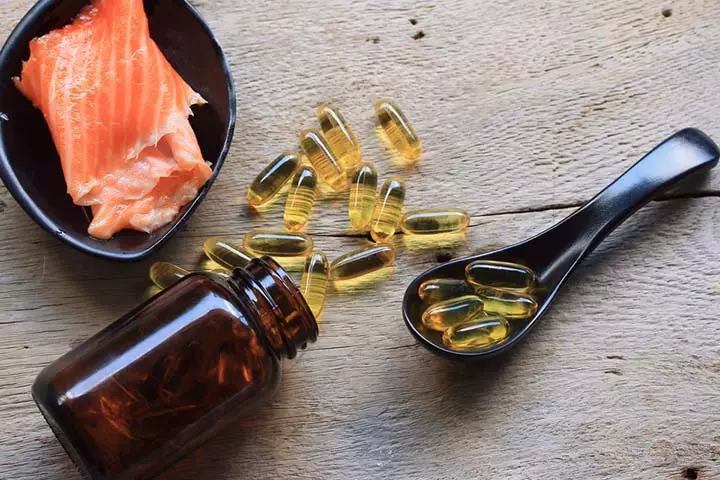
Image: Shutterstock
Fish oil derived from cold water fish such as salmon, sardines, herring, tuna, and anchovies is safe. Always buy your fish oil supplements from a reliable manufacturer to rule out the presence of mercury and other toxins in it. A reputed manufacturer of fish oil will be able to offer documentation as evidence of the purity of the fish oil.
In any case, it is good to be cautious when taking fish oil during pregnancy.
 Point to consider
Point to considerPrecautions To Take While Consuming Fish Oil Supplements or Pills
If you plan to take fish oil supplements during pregnancy:
- Check for the Natural Product Number (NPN) on the cover. NPN indicates that the supplement has been tested for toxins, pesticides, and heavy metals.
- Do not take a supplement if you are not sure of the fish oil’s purity. Go for reputed brands upon your doctor’s advice.
- Check if clinical research data backs the product, to be sure of the brand’s efficacy.
- Avoid taking fish oil supplements if you are allergic to fish.
 Be watchful
Be watchful- Consider taking the dosage upon doctor’s prescription.
- Some prenatal vitamins may contain omega-3 fatty acids. Check the label to avoid overdosing that may occur if you are taking such prenatal vitamins with omega-2 fish oil supplements.
- Consult with your doctor before starting any new supplements, especially if you have pre-existing health conditions or are taking any medication.
Next, we answer a few common queries about fish oil intake during pregnancy.
Frequently Asked Questions
1. How long should you take fish oil while pregnant?
There is no medical recommendation for taking fish oil during pregnancy. If you include oily fish in your diet, there is no need for additional supplementation. You may have up to two portions of oily fish every week, to get the required dose of omega-3 fatty acids. Fish oil supplements also contain other nutrients such as iron, calcium, and Vitamins A, B2, C, and D.
2. Are fish oil and omega-3s the same thing?
No, fish oil and omega-3s are not the same. Fish oil is an excellent source of omega-3 fatty acids, which are also found in flaxseeds, dark leafy greens, and walnuts.
3. Can I take folic acid and omega-3 together during pregnancy?
Folic acid and omega-3 fatty acids are vital to the baby’s development, and taking them together is usually considered safe (11).
4. Can DHA cause bleeding in pregnancy?
Studies have linked high intake of DHA to bleeding during pregnancy, prolonged gestation, and premature labor (12). Follow the doctor’s prescription and dosage advice.
Fish oil extracted from the body is safe when pregnant. Our bodies cannot synthesize essential fatty acids making it necessary to obtain them through diet. Fish oil during pregnancy boosts nutrition and serves as an excellent source of omega-3 fatty acids, crucial for fetal brain development. Other benefits include balanced prostaglandin production, mood modulation, and prevention of preeclampsia. However, you should consume fish oil as supplements only after consulting your doctor, as overconsumption or the wrong choice of supplements may cause side effects such as altered blood clotting or even harm the baby.
Infographic: Omega-3 Foods For Vegetarian/Vegan Moms-To-Be
Fish isn’t the only source of omega-3 fatty acids. Our infographic lists plant-based foods that can also provide sufficient omega-3 to soon-to-be vegetarian/vegan mommies. Check out these foods and different ways to include them in your pregnancy diet. Illustration: Momjunction Design Team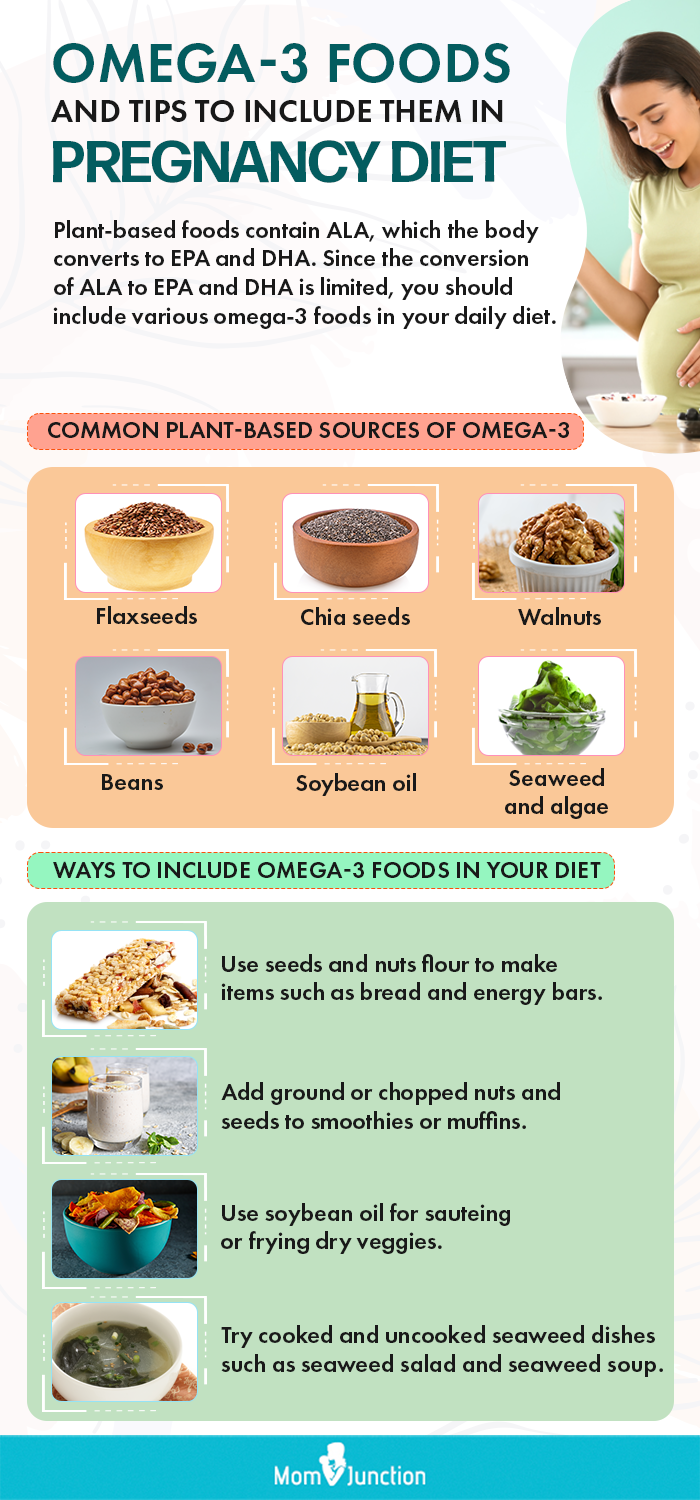
Illustration: Is It Safe To Take Omega-3 Fish Oil Supplements in Pregnancy?
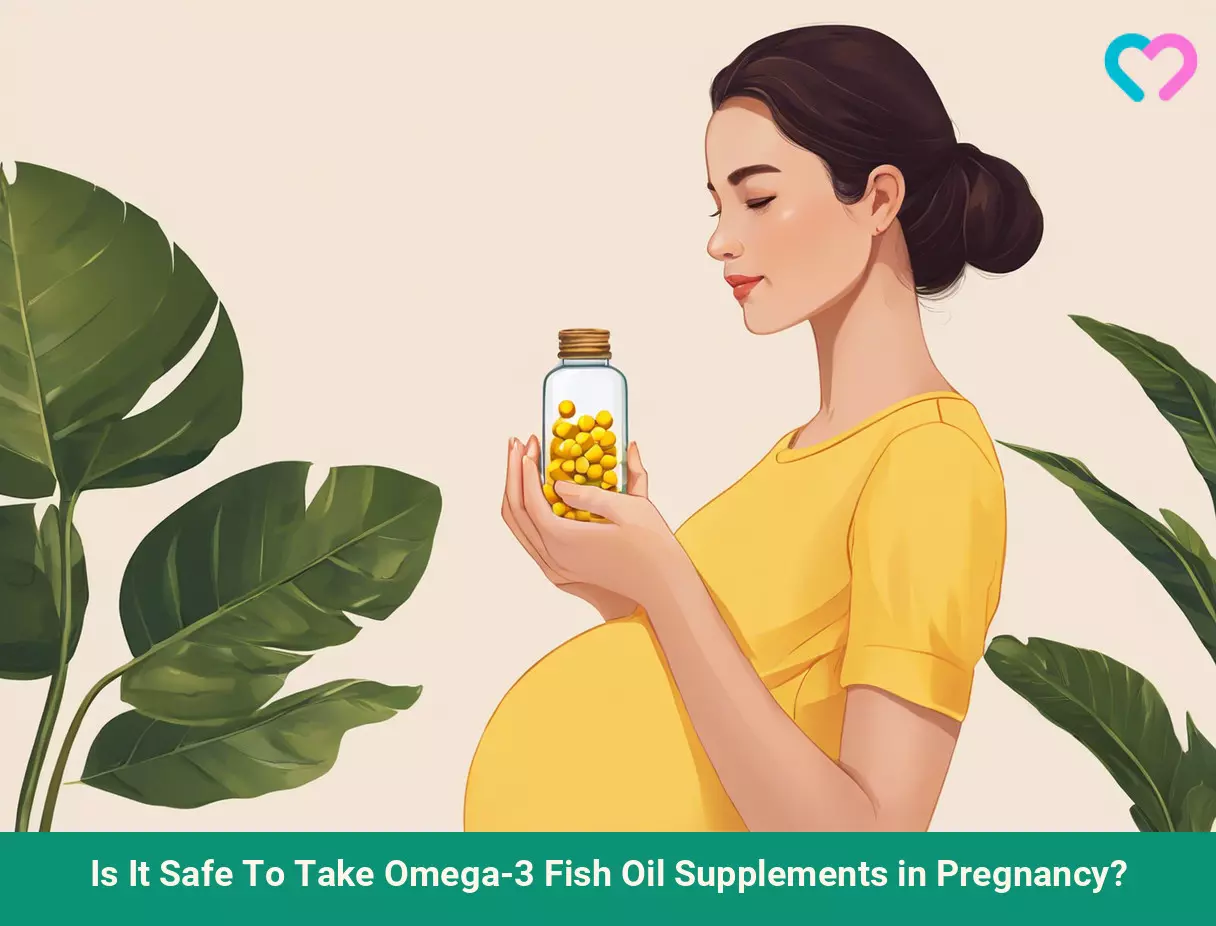
Image: Stable Diffusion/MomJunction Design Team
It is advised to take precautions when eating fish during pregnancy. But can pregnant women taking fish oil make their babies smarter? Watch this video to find out!
References
- James A Greenberg et al.; Omega 3 fatty acid supplementation during pregnancy.
https://www.ncbi.nlm.nih.gov/pmc/articles/PMC2621042/ - Omega-3 fish oil and pregnancy, APA.
https://americanpregnancy.org/healthy-pregnancy/pregnancy-health-wellness/omega-3-fish-oil-and-pregnancy/ - Kuan Pin Su et al.; (2015); Omega-3 polyunsaturated fatty acids in prevention of mood and anxiety disorders.
https://www.ncbi.nlm.nih.gov/pmc/articles/PMC4540034/ - Juliana Rombaldi Bernardi et al.; Fetal and neonatal levels of omega-3: effects on neurodevelopment, nutrition and growth.
https://www.ncbi.nlm.nih.gov/pmc/articles/PMC3483668/ - Melinda Phang and Michael R. Skilton; Marine Omega-3 Fatty Acids, Complications of Pregnancy and Maternal Risk Factors for Offspring Cardio-Metabolic Disease.
https://www.ncbi.nlm.nih.gov/pmc/articles/PMC5983270/ - Janet A Dunstan and Susan L. Prescott; Does fish oil supplementation in pregnancy reduce the risk of allergic disease in infants.
https://pubmed.ncbi.nlm.nih.gov/15864078/ - James J DiNicolantonio and James OKeefe; (2019); Importance of maintaining a low omega-6/omega-3 ratio for reducing platelet aggregation, coagulation, and thrombosis.
https://www.researchgate.net/publication/332839839_Importance_of_maintaining_a_low_omega-6omega-3_ratio_for_reducing_platelet_aggregation_coagulation_and_thrombosis - Omega-3 fatty acids, Colorado State University.
https://extension.colostate.edu/docs/pubs/foodnut/09382.pdf - James A. Greenberg et al.; (2008); Omega-3 fatty acid supplementation during pregnancy.
https://www.ncbi.nlm.nih.gov/pmc/articles/PMC2621042/ - Fish oil, cod liver.
https://fdc.nal.usda.gov/fdc-app.html#/food-details/173577/nutrients - Eating Well for a Healthy Pregnancy.
https://extension.colostate.edu/topic-areas/nutrition-food-safety-health/eating-well-for-a-healthy-pregnancy-9-388/ - Omega-3 Fatty Acids in Pregnancy—The Case for a Target Omega-3 Index.
https://www.ncbi.nlm.nih.gov/pmc/articles/PMC7230742/
Community Experiences
Join the conversation and become a part of our nurturing community! Share your stories, experiences, and insights to connect with fellow parents.
Read full bio of Nupur Agarwal
- Hannah Whittaker is an expert pregnancy and pediatric dietitian with nearly 20 years of experience, the last 7 years as a registered dietitian. She manages her private practice Bump2baby Nutrition in the UK, having done her graduation in community nutrition and dietetics from Liverpool John Moores University & University of Chester respectively.
 Hannah Whittaker is an expert pregnancy and pediatric dietitian with nearly 20 years of experience, the last 7 years as a registered dietitian. She manages her private practice Bump2baby Nutrition in the UK, having done her graduation in community nutrition and dietetics from Liverpool John Moores University & University of Chester respectively.
Hannah Whittaker is an expert pregnancy and pediatric dietitian with nearly 20 years of experience, the last 7 years as a registered dietitian. She manages her private practice Bump2baby Nutrition in the UK, having done her graduation in community nutrition and dietetics from Liverpool John Moores University & University of Chester respectively.
Read full bio of Rebecca Malachi
Read full bio of Swati Patwal
Read full bio of Dr. Joyani Das






